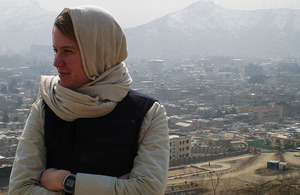A civilian's Afghan experience
Deploying on operations is par for the course for the military, but for civilians it is a completely different ball game. Leigh Hamilton reports.

Ministry of Defence policy advisor Jenna Clare in Kabul, Afghanistan [Picture: Crown Copyright/MOD 2010]
For some civil servants, deploying to an operational theatre can seem quite daunting. But leaving the safety of your office and your home comforts behind to spend time in a place like Afghanistan is usually a choice, rather than a requirement.
Jenna Clare is one of many MOD civil servants who have made that choice. She was faced with the dilemma of making this difficult decision when she was asked to step in at short notice to cover for an ill colleague. But, she says, travelling to and working in Afghanistan was an experience that changed her life.
From January until May 2010, Jenna took up post as the policy advisor (POLAD) to the Brigadier Commanding Headquarters Joint Force Support (Afghanistan) [HQ JFSp(A)], and was based in Camp Bastion for the duration.
POLADs are deployed MOD civil servants who work directly to the military commander of an operational headquarters and operate as part of the Command Group. The role is principally about ensuring that national policy takes proper account of the needs and views of the deployed commander and that they are clear that they are operating within government policy.
As well as at HQ JFSp(A) in Bastion, POLADs are working in Afghanistan in support of Task Force Helmand’s HQ in Lashkar Gah, Regional Command (South West) in Bastion, and at HQ International Security Assistance Force (ISAF) in Kabul.
At JFSp(A), the HQ has a variety of roles, including detention and dealing with contractors working for ISAF forces.
On arrival in Afghanistan, Jenna was unsure how she would be welcomed, but soon settled into her new surroundings:
With the guys I was working with, they were all phenomenally bright and right on top of their game,” she said. “Initially they were questioning who I was and what I was doing, but once I explained my role, they were fabulous.
I made some really good friends. At the headquarters I was very much taken into the fold. With the military, as everyone moves around a lot, they are quick to form new groups and they are very welcoming to new members.
From working in a desk job at the MOD’s Main Building in London, to the dusty heat in Afghanistan, the change in environment and pace certainly proved challenging for Jenna:
It’s given me a lot of confidence as you have to throw yourself in the deep end. The environment’s pretty extreme, the job’s pretty extreme, and you know that you might sink or you might swim - you just don’t know.
Although challenging, the experience gave Jenna a sense of clarity:
When you’re working in Defence, a lot of the time you’re toiling away and there’s a lot of you trying to work on a very small part of it and it’s difficult to see the whole picture,” she said.
Being on operations in theatre, you can see what the whole thing is for. The whole of the MOD suddenly makes sense. I’ve done various jobs in the MOD and some people question how they fit into the bigger picture, but when you’re out there it all snaps into place.
Of course, civil servants do receive pre-deployment training before entering an operational theatre and everything is done to ensure they are safe, but still, going outside the wire can be an exciting, albeit scary, prospect:
It’s one of those things that afterwards you think ‘I should have been quite scared’, but at the time you’re just thinking ‘this is great!’” Jenna said.
If you work in the HQ, you are co-ordinating an awful lot of action, there’s a lot of stuff going on out there. You know all about it because you’re in the headquarters and running it, but you’re not seeing it. There’s all this stuff happening and you want to be part of it.
Everyone I was working with would always be jealous when they heard someone was going outside the wire. You want to see where things are happening.
The contrast of the excitement of being on the ground with the grim reality of being in a war zone struck a sombre tone with Jenna and she got a close-up view of the tragic side to operations:
The helicopter landing pad for the hospital was right outside our headquarters, so if you heard a helicopter overhead, that sounded like it was about to land on the roof, you knew that someone had just been killed or had been seriously injured.
She found the repatriation ceremonies particularly moving:
Two or three thousand people would gather and hold a vigil outdoors at sunset and at every single one the Last Post was played and it used to get to me every time. Everyone would cry. At the end of every one, they’d say when you go home, tell them about us and say ‘for your tomorrows, we gave our today’. It really gets to you on a personal level.
Overall, Jenna feels that her time in Afghanistan has changed her as a person:
My experience in Afghanistan has definitely changed me. I now understand Defence - I get it. It gives you a really good understanding about the way things work and what is important and what’s not.
Most of all it’s one of those things, once the suntan has faded, you can tell your grandchildren that you went to Afghanistan. It’s something really different and not many people have done it. Fundamentally it’s about going out there and seeing what it’s like on the ground.
This report by Leigh Hamilton features in the June 2011 issue of Defence Focus - the magazine for everyone in Defence.